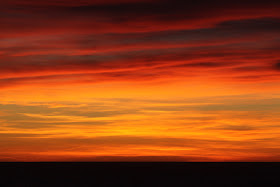We were in New England for the holiday and were treated to a beautiful, gentle snowfall on December 25th. It was cold enough that the snowflakes didn't melt immediately. Views of individual snowflakes were exceptional against a thin sheet of ice on a small woodland pond.
This was my first time trying to photograph snowflakes -- I have a lot to learn! But check out the variety of shapes and structures below.
Wednesday, December 28, 2011
Saturday, December 17, 2011
Waterbirds in Tomales Bay and winter sunset
Counting waterbirds in Tomales Bay for an Audubon Canyon Ranch census and the Point Reyes Christmas Bird Count on 17 December:
Surf Scoters (2 males, 1 female) with Horned Grebe taking off in the background
A flock of Pacific Loons near Tom's Point
A vivid sunset off Bodega Head on 16 December
Thursday, December 15, 2011
Shorebird silhouettes at sunrise
Early morning light in Bodega Harbor and a falling tide --
Dunlin
Marbled Godwit (left) and Willet (right)
Black-bellied Plover (front)
Monday, December 12, 2011
Shorebirds and American Pipit on Salmon Creek Beach
Beautiful views of shorebirds on Salmon Creek Beach today. At low tide they feed on the tidal flats in Bodega Harbor, but during the highest tides flocks of sandpipers and plovers can be seen roosting on the outer beach.
Western Sandpiper
Flock of shorebirds against the waves.
American Pipit feeding on flies among piles of drift algae and eelgrass. Pipits are one of the most common songbirds on the beach during the winter.
Black-bellied Plovers roosting among driftwood (they only have black bellies in breeding plumage during the spring/summer/fall).
Black-bellied Plover in front of a flock of Dunlin.
Black-bellied Plovers and Dunlin for size comparison.
Flock of shorebirds against the waves.
Sunday, December 11, 2011
Coyote on webcam!
I was just checking the Bodega Marine Laboratory webcam to see what the weather conditions were like at the coast. I was quite surprised to find a coyote in the image -- see photo below from webcam. The webcam photos are updated every 5 minutes, so the chances of catching a coyote passing by seem pretty slim. This is also relevant to the blog post on December 1st when I was wondering about how some gumboot chitons had made it to the grassland. Eric's favorite theory is that a coyote brought them up from the beach...perhaps he's right!?
Saturday, December 10, 2011
Lunar eclipse
Total eclipse of the moon in the early morning of 10 December 2011. This photo was taken from Bodega Head overlooking the Pacific Ocean. It was just before the Earth's shadow completely covered the moon around 6 a.m.
Sunday, December 4, 2011
Waterfowl
There's a small freshwater pond in the dunes that occasionally hosts waterbirds like ducks and grebes. This isn't a great photo, but for the record it documents three species of ducks -- Gadwall, American Wigeon, and Green-winged Teal. Look for the small black-and-white wing patches with white closer to the tail (Gadwall), large black-and-white wing patches with white closer to the head (wigeon), and bright green wing patches (teal). At least 27 species of ducks have been recorded near Bodega Head.
Saturday, December 3, 2011
Snowy Plovers
Today I spent some time with shorebirds in Bodega Harbor. I was trying to find banded Snowy Plovers. The Point Reyes Bird Observatory is interested in tracking known individuals. During the past year I have seen about 10 different banded plovers -- some that were banded to the north (Humboldt, Oregon) and others that were banded to the south (Salinas, Vandenberg AFB near Lompoc).
Here are two Snowy Plover photos -- one close up, and another with bands (blue/aqua/blue on the left leg and white on the right leg). This bird was banded at the Tahkenitch Area of the Oregon Dunes in 2010.
Thousands of shorebirds spend the winter in Bodega Harbor. The last photo shows a flock of Dunlin (primarily) flying by during the flood tide.
Here are two Snowy Plover photos -- one close up, and another with bands (blue/aqua/blue on the left leg and white on the right leg). This bird was banded at the Tahkenitch Area of the Oregon Dunes in 2010.
Thousands of shorebirds spend the winter in Bodega Harbor. The last photo shows a flock of Dunlin (primarily) flying by during the flood tide.
Thursday, December 1, 2011
Chitons in the grassland
A few days ago, Eric came across a gumboot chiton (Cryptochiton stelleri) on the road. An odd place for a chiton, to say the least! Well, today I encountered the remains of at least 6 gumboot chitons in the grassland, about 50 feet away from the beach! Here are two photos, one with most of the tissue still in place, another where only the plates remain.
Gumboot chitons washed ashore during an algal bloom in late August/early September this year. It's interesting to imagine a possible connection between phytoplankton in the ocean and chitons in the grassland!


































